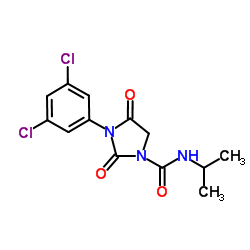Iprodione

Iprodione structure
|
Common Name | Iprodione | ||
|---|---|---|---|---|
| CAS Number | 36734-19-7 | Molecular Weight | 330.167 | |
| Density | 1.5±0.1 g/cm3 | Boiling Point | 481.1±55.0 °C at 760 mmHg | |
| Molecular Formula | C13H13Cl2N3O3 | Melting Point | 130-134 °C(lit.) | |
| MSDS | Chinese USA | Flash Point | 244.7±31.5 °C | |
| Symbol |


GHS08, GHS09 |
Signal Word | Warning | |
|
Multiresidue method for the determination of 13 pesticides in three environmental matrices: water, sediments and fish muscle.
Talanta 85(3) , 1500-7, (2011) Pesticides residues in aquatic ecosystems are an environmental concern which requires efficient analytical methods. In this study, we proposed a generic method for the quantification of 13 pesticides (azoxystrobin, clomazone, diflufenican, dimethachlor, carbe... |
|
|
Ultraviolet-vis degradation of iprodione and estimation of the acute toxicity of its photodegradation products.
J. Chromatogr. A. 1371 , 146-53, (2014) The UV-vis photodegradation of iprodione in water was investigated with a high pressure mercury lamp photoreactor. Five photoproducts of iprodione were characterized by LC-HR-MS/MS and isotopic labeling; none of them has been reported in previous studies. Thr... |
|
|
Molecular characterization, fitness and mycotoxin production of benzimidazole-resistant isolates of Penicillium expansum.
Int. J. Food Microbiol. 162(3) , 237-44, (2013) Penicillium expansum field-strains resistant to benzimidazole fungicides were isolated in high frequency from decayed apple fruit collected from packinghouses and processing industries located in the region of Imathia, N. Greece. In vitro fungitoxicity tests ... |
|
|
Resistance to fludioxonil in Botrytis cinerea isolates from blackberry and strawberry.
Phytopathology 104(7) , 724-32, (2014) Site-specific fungicides, including the phenylpyrrole fludioxonil, are frequently used for gray mold control but are at risk for the development of resistance. In this study, field isolates that were low-resistant (LR) and moderately resistant (MR) to fludiox... |
|
|
Characterization of iprodione resistance in Botrytis cinerea from strawberry and blackberry.
Phytopathology 104(4) , 396-402, (2014) Gray mold, caused by the fungal pathogen Botrytis cinerea, is one of the most destructive diseases of strawberry. Control of the disease in commercial fields is largely dependent on the application of fungicides, including the dicarboximide iprodione. Single-... |
|
|
Sensitivity of Penicillium expansum field isolates to tebuconazole, iprodione, fludioxonil and cyprodinil and characterization of fitness parameters and patulin production.
Int. J. Food Microbiol. 145(1) , 195-204, (2011) A total of 236 Penicillium expansum field isolates from decayed apple fruit collected from packinghouses and processing industries located in the region of Imathia, Northern Greece were tested for their sensitivity to tebuconazole, fludioxonil, iprodione and ... |
|
|
Development of a new cucumber reference material for pesticide residue analysis: feasibility study for material processing, homogeneity and stability assessment.
Anal. Bioanal. Chem 407(11) , 3083-91, (2015) The feasibility of the production of a reference material for pesticide residue analysis in a cucumber matrix was investigated. Cucumber was spiked at 0.075 mg/kg with each of the 15 selected pesticides (acetamiprid, azoxystrobin, carbendazim, chlorpyrifos, c... |
|
|
Genotoxic effects of the pesticides Rubigan, Omite and Rovral in root-meristem cells of Crepis capillaris L.
Mutat. Res. 652(2) , 191-7, (2008) Three pesticides have been studied for their genotoxicity by the use of assays in the plant Crepis capillaris, aimed at measuring chromosomal aberrations, micronuclei and sister chromosome exchange (SCE). The fungicides Rubigan 12 EC (fenarimol) and Rovral 25... |
|
|
Functional and structural comparison of pyrrolnitrin- and iprodione-induced modifications in the class III histidine-kinase Bos1 of Botrytis cinerea.
PLoS ONE 7(8) , e42520, (2012) Dicarboximides and phenylpyrroles are commonly used fungicides against plant pathogenic ascomycetes. Although their effect on fungal osmosensing systems has been shown in many studies, their modes-of-action still remain unclear. Laboratory- or field-mutants o... |
|
|
Biological monitoring of pesticide exposures in residents living near agricultural land.
BMC Public Health 11 , 856, (2011) There is currently a lack of reliable information on the exposures of residents and bystanders to pesticides in the UK. Previous research has shown that the methods currently used for assessing pesticide exposure for regulatory purposes are appropriate for fa... |